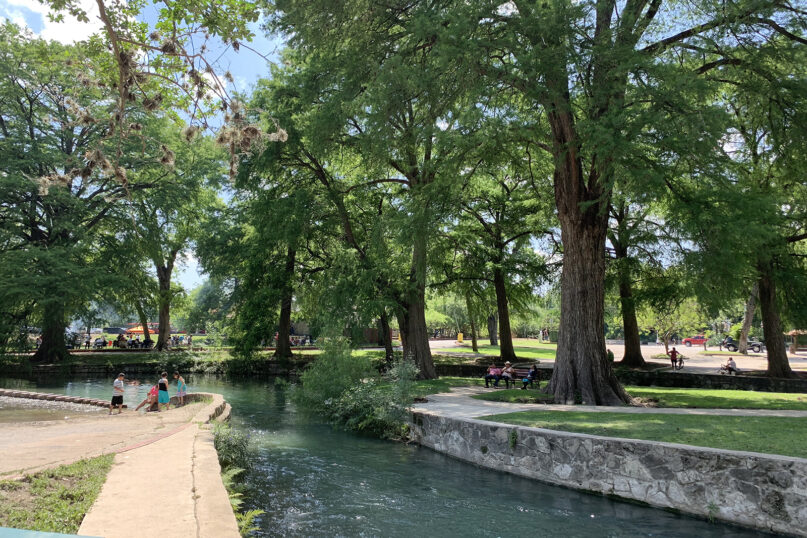(RNS) — For Gary Perez and Matilde Torres, like their ancestors before them, the river bend in Brackenridge Park in South Texas is more than the oak trees along the riverbank, the slow-moving water and the stars arrayed above at night. It is a sacred place, where the resident cormorants, they believe, take their prayers to the heavens.
That is why, when the city of San Antonio decided to remove 69 of 83 trees and prevent bird nesting in the river bend to allow the remodeling of a wall, Perez and Torres, ceremonial leaders of the Lipan-Apache Native American Church, sued to protect it on religious grounds.
Last week, the Texas Supreme Court heard their lawsuit challenging the city’s actions under a state constitutional amendment approved by Texas voters in 2021 to deal with restrictions on religious services imposed by local officials during the COVID-19 pandemic.
The Religious Services Amendment to the Texas Constitution says that the state or a political subdivision of the state “may not enact, adopt or issue a statute, order, proclamation, decision, or rule that prohibits or limits religious services.”
John Greil, an attorney and professor at the University of Texas law school’s Law & Religion Clinic, represents Perez and Torres in Perez v. City of San Antonio. He noted that Perez and Torres are the first claimants to bring a suit under the Religious Services Amendment, giving the court’s decision in the case significant weight as a precedent.
“If 20 years down the road, there’s some emergency and cities start putting in new orders that would affect religious services, this case will determine how that amendment gets applied in the future,” Greil told RNS.

Visitors along the winding San Antonio River in Brackenridge Park in San Antonio. (Photo courtesy of Brackenridge Park Conservancy)
Perez and Torres perform their ceremonies at a part of the park known as Lambert Beach, they explained, because of their people’s ancestral connection to the land. They consider the waters, birds, trees and constellations above a “sacred ecology” and a tenet of the Native American Church. They believe that the San Antonio River bend is central to their creation story, which combines Indigenous and Christian traditions.
“Imagine removing the Old Testament and trying to surmise what happened within the New Testament,” Perez said. “By removing the trees and the birds, and destroying this spiritual ecology, there’s no reference back to the Old Testament. There is no hope.”
The two appellants’ brief provided evidence that for thousands of years Indigenous peoples have worshipped at this river bend, based on hieroglyphics found elsewhere in Texas.
The brief argues that worship cannot be done elsewhere because the specific attributes to the place are crucial to their ceremonies. If the trees are obstructed, if the birds are removed, Perez and Torres’ ability to worship would be gone forever.
“The city of San Antonio has chosen a construction design that will remove all but 14 of the 83 trees at the bend … without any consideration of the plaintiffs’ religious exercise,” Greil said before the Texas Supreme Court on Wednesday (Dec. 4).
A spokesperson for the city of San Antonio told RNS that the city’s current plan includes “a reduction in the number of trees planned for removal from 105 trees to 77 trees for Phase I and II of the project. Forty trees will be relocated rather than removed altogether and approximately 270 trees will be planted on site.”
At the hearing, Texas Deputy Solicitor General William Cole argued that the amendment was “not a Swiss Army knife of religious liberty” and that “the amendment’s scope is designed to protect the right to gather.”
Hiram Sasser, executive senior counsel for First Liberty Institute, a religious liberty advocacy group that submitted an amicus brief to the court, told RNS he was dissatisfied with the arguments from the state last week.
“I was shocked that Deputy Solicitor General Cole said that Article I, Section 6-a does not prohibit the government from banning singing in churches, especially after the Texas Legislature fought so hard to give that freedom to churches after COVID shutdowns by tyrant local officials. I hope Attorney General (Ken) Paxton corrects the record and deals with this problem,” said Hiram.